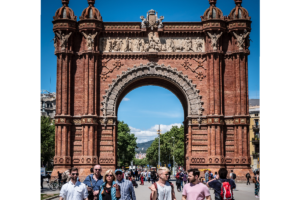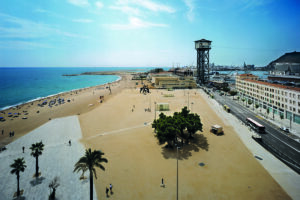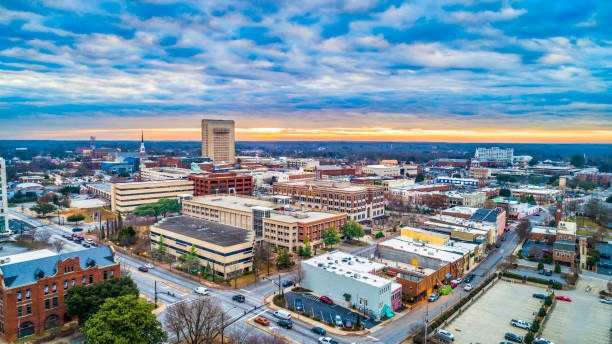La Barcelona del Turismo: Whatever will be, will be. But always Barcelona

Photography: Jordi Bernadó

Jesús García Castillo
Lawyer at Pérez-Llorca

Daniel Senserrich Guitart
Commercial Manager en VilaViniteca
Like the opening chord in a concert by your favorite band, Barcelona bewitches you from the moment you arrive. Barcelona is an explosive mix of outstanding features that make it unique. Following the adrenaline charge of the ’92 Olympic Games, Barcelona has risen to be one of the top tourist destinations in the world.
Its historical, cultural and architectural heritage is unparalleled; it boasts world class leisure, shopping and gastronomy; and its situation between the Mediterranean and the Serra de Collserola endows it with a pleasant climate all year round, making it a serious competitor amongst sun and sea destinations.
In short, whoever you are and whatever you’re looking for, you’ll find it in Barcelona.
Proof of this is the fact that the city attracted an astronomical 12 million tourists in 2019. Although the figure plummeted to 4.5 million in 2021, which some may consider sufficient, the city obviously has the potential to achieve much more.

What happened?
The pandemic brought the world to a standstill in 2020 and the economy collapsed.
Lockdown meant that hospitality, large events, and, tourism were relegated to the background, as the world struggled to survive the biggest social and health crisis of the last hundred years.
The political tensions of recent times have also meant that Spaniards from other parts of the country stayed away.
And to make matters worse, just when it seemed that we were returning to normal after almost two years, the Russians invaded Ukraine. This has major implications for tourism. In addition to the obvious negative economic consequences of a military conflict and for tourism in general, Russia was historically the sixth largest tourist market for the city. And war in Europe also puts off international tourists, in particular, North American tourists, who are the main foreign tourist market and the third in terms of spending.

Is Barcelona's success as a tourist destination being undermined only by unforeseeable external factors?
Not entirely. The “tourists go home” movement had considerable popular support during the first years of the current town council’s term of office, following the previously uncontrolled growth of tourism.
A tourist tax, the refusal to expand the airport, limitations on vacation rentals, and the moratorium on hotel building are all manifestations of this movement. Though based on a not unreasonable desire to pursue a more sustainable form of tourism, the approach is out of step with the current needs of the metropolis, which, in these turbulent times, is now whispering “tourists come back”.
The situation is made worse by other intrinsic issues such as high taxes and excessive bureaucracy that discourage new opportunities for investment and entrepreneurship. As in other sectors, this affects tourism.
How much is it costing us?
Unfortunately, all these “turismofobia” have repercussions, and highly promising projects are passing us by.
The situation may explain why Barcelona was not chosen to be headquarters of the European Medicines Agency, which would have given the city global exposure during the pandemic. Nor will there be a branch of the Hermitage Museum in Barcelona, a very promising project that failed to receive the support of the town council. Apart from being a first-class tourist attraction, the project would have brought almost 400 jobs and an investment of 50 million euros to the city. The same fate befell the “Four Seasons” hotel project in Barcelona, a spectacular project that was certain to have attracted visitors from Spain and around the world. The plans were abandoned when the Barcelona City Council rejected the urban planning change proposed by the project’s promoters.
Fortunately, it is not all bad news.
The winds of change are blowing
If there is one thing that is certain, it is the resilience of Barcelona and its citizens. And it seems that things are now looking up. Despite the war and other factors, 2022 has given us reasons to hope.

One clear sign of recovery is the return of the Mobile World Congress after two years, an event which achieved almost 70% capacity this year. The recent confirmation that Barcelona will host the next America's Cup in 2024 is also great news for the city, considering that the competition is the third largest sporting event worldwide in terms of investment, around a billion euros, and attracting an audience of some 950 million spectators around the world. The project has become a reality thanks to public-private collaboration, and is an initiative backed by Barcelona Global’s investment agency Barcelona & Partners, which played a key role in bringing the event to the city.
Likewise, it appears that COVID is well on the way to being treated as a seasonal flu virus. If the trend continues, this would bring a return to normality to the important hospitality industry (one of the hardest hit by the pandemic). Furthermore, the arrival of the expected European “next generation” ” recovery funds will mean nearly 40 billion euros will go to supporting thirty projects around Catalonia.
What course should we take?
Momentum is essential, so Barcelona needs to take advantage of the tailwind. To do this, we must set out a clear roadmap that will make Barcelona a benchmark for high quality tourism and recover the trust of tourists.
We believe that we need to make changes. A better city for the people of Barcelona will also mean a more attractive city for visitors. Well-kept, safe, clean public spaces are essential, along with other perhaps less visible, but equally important aspects.

We believe that improving the quality of life of local people and making Barcelona a convenient, modern, up-to-date city are crucial for recovery. Improvements in mobility, the digital transition of the city and its infrastructures, the attraction of talent, and a more professional labor market are important, as are public-private collaboration and new forums for dialogue to help meet these challenges.
There is still a lot of work to be done, but the future looks promising if we take the right course. Barcelona is capable of rising to the greatest of challenges. Despite living in turbulent times, the ambition and resilience of the people of Barcelona and their love for their city will take the city in the right direction. Barcelona will always be Barcelona.
If you want to know the latest English news about Barcelona and the people who bring it to life, sign up to our Blog.







